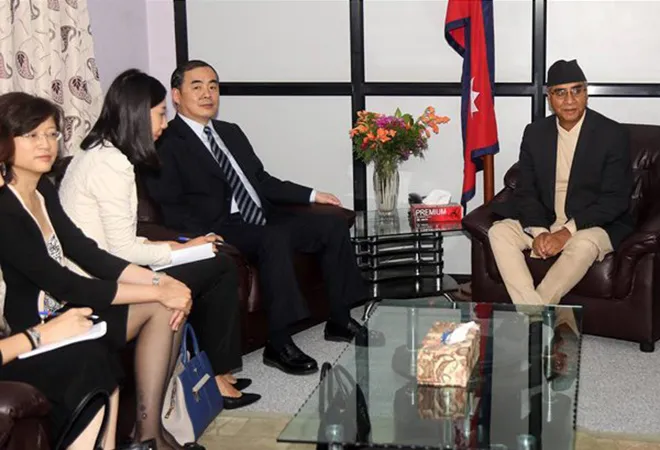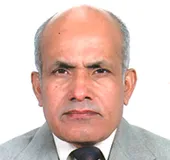-
CENTRES
Progammes & Centres
Location
When the political situation in Nepal is fluid, it is necessary to balance relations with China and India to maintain peace and stability.

Image Source: Sher Bahardur Deuba
Prime Minister Deuba with a delegation from Beijing
In Kathmandu, the government has changed once again. And Sher Bahadur Deuba, the senior Nepali Congress leader, has assumed the prime ministership, following the resignation of Pushpa Kamal Dahal, popularly known as Prachanda, on 24 May. His resignation came at the end of his nine month tenure as per the understanding reached between the two leaders. In fact, no government in Nepal lasts for more than a year because of the political instability.
Deuba has become the Prime Minister at a time when Nepal is struggling with unprecedented challenges both at the domestic and external fronts.
Deuba is not a new figure in Nepalese politics. He has been the Prime Minister for three times earlier too. This time, he was able to secure the support of 388 members of parliament (MPs) with 170 against and 35 absentees. He was just short of nine votes to get two-thirds votes in the parliament of 594 members. This shows the strong clout that he enjoys in the parliament.
Immediately after taking oath as the Prime Minister, Deuba said that his top priority was to implement the constitution. He has taken the responsibility to conduct the three-tier election at the local, provincial and parliamentary level till January 2018.
To secure the confidence of the agitating Madhesh-centric political parties in the forthcoming elections, Deuba has signed a three-point agreement with the newly formed Rastriya Janata Party Nepal (RJPN), a unified force of six political parties of Terai. In the agreement, he committed to forming Federal Commission, amend the Constitution, withdraw the cases against those involved in Madheshi movement and increase the number of units at the local level in Terai.
However, in practice, Deuba did little to amend the Nepalese constitution and meet the demands of the agitating Madheshi and Hill-Janajati groups. Instead, he seems to be determined to conduct the second phase of local elections in the Terai on June 28, forgetting the commitment he made with the RJPN through the three-point agreement.
So far, the constitution has not been implemented mainly on account of the opposition made by over two-thirds of Nepal's population, including the Madheshis, Tharu, Hill-Janajati and Dalit groups who constitute the bulk of the country's total population. During the movement against the state in 2015-16 for bringing out the controversial constitution, as many as 60 people were killed in different parts of Terai and thousands of people were injured.
Presently, Deuba has started facing the ire from the agitating Madheshi and Hill-Janajati groups represented by the RJPN and the Federal Alliance because of his indifference towards their cause.
As per the decision of the agitating groups, their leaders have reached different districts to disrupt the elections. Accordingly, torch rallies were held in district headquarters on June 12. A general strike was called for in the Terai districts and Eastern Hills between June 13 and 16. Also, the plan was made to padlock election offices and initiate lathi (stick) rallies on 16 June. Another lathi rallies were held at district headquarters on June 19. And, finally, indefinite general strikes are to be resumed from June 24 to foil any attempt to be made by the government to impose elections on the people on 28 June.
Mahantha Thakur, the coordinator of the RJPN, has said, "We are forced to resort to protests as the government has failed to address our concerns despite our repeated requests and a series of negotiations." But the government is in no mood to extend the date of elections. As the Terai region is polarised on 'pro' and 'anti' election issue, the possibility of violence in Terai cannot be easily ruled out.
Apart from some of these challenges at the domestic front, Prime Minister Deuba is also having problems on the external front. For quite some time, three external actors appear to have become hyperactive in Nepal. India, China and the West have their own interests in this country. Because of geo-economic and political factors, India does not want to lose its strong clout in Nepal. But of late, China has become aggressive in Nepalese politics. It wants to erode India's influence in this country. Over and above, the West wants to make deep penetration in Nepal's internal affairs through proselytisation in different parts of the country.
Of the three external power blocks, the rivalry between India and China has become a matter of serious concern.
The rivalry between the two giants is well reflected in all important areas like the constitution making, awarding of tenders in bigger projects, engagement with political parties and administrative wings, aid and assistance, infrastructure sector in Nepal, etc.
Realising the sensitivities of geopolitical realities, Deuba has rightly felt the need to balance the country's relations, particularly with two of its neighbours.
Unfortunately, Nepal's growing tilt towards one of its neighbours has greatly added sensitivities in the other. While making a federal constitution, the concern of one of the neighbours in regard to the demarcation of provincial boundaries north to south on vertical line was realised. But the suggestion of the other neighbour to take each section of the society on board to make the constitution more inclusive was overlooked. As if this was not enough, one of the neighbours was unnecessarily blamed by Kathmandu for imposing an economic blockade in Nepal to divert people's attention from the core Madheshi issues.
Certain forces have tried to create tensions in the region through such activities as the 10 point agreement, joint military exercises and Belt and Road Initiative. And, now through the local elections in Terai, a deliberate attempt is being made to create conflict right across India's border in Terai.
Now the time has come for Deuba to take the serious initiative to balance Nepal's relations with both of its neighbours if he wants to save the country from further chaos. However, 'balancing' of relations do not mean equal relations between the neighbours. It, rather, means giving greater priority in relations to the one from which the country receives largest benefits.
If Prime Minister Deuba has to prove his worth, he needs to take the hard decision to postpone local elections in Terai till the period the demands of the Madheshis, Tharus, Hill-Janajatis and Dalits are addressed through the amendment of the constitution. Any attempt to impose elections on the majority of the population against their will might prove counterproductive. The legitimacy of the constitution will also be questioned when a great mass of the population boycott the elections.
At a time political situation in the country is fluid, it is all the more necessary to balance relations with the external forces and especially with the closest one to seek its support in maintaining peace and stability in the country.
The views expressed above belong to the author(s). ORF research and analyses now available on Telegram! Click here to access our curated content — blogs, longforms and interviews.

Hari Bansh Jha was a Visiting Fellow at ORF. Formerly a professor of economics at Nepal's Tribhuvan University, Hari Bansh’s areas of interest include, Nepal-China-India strategic ...
Read More +